Hard Flooring Trends: Blending Tradition and Innovation

Posted June 10, 2024
As we step into the 2024-25 season in New Zealand, the evolution of hard flooring trends reflects a fascinating blend of traditional materials and innovative designs, reshaping the way we think about our spaces.
With the latest updates to New Zealand's building code (E3/AS1), homeowners now have the freedom to experiment with a broader range of materials in wet areas, marking a significant shift in interior design preferences.
Here, we explore the leading hard flooring trends that are set to dominate homes across New Zealand, from natural stone and tiles to the rising popularity of timber flooring in kitchens and bathrooms.
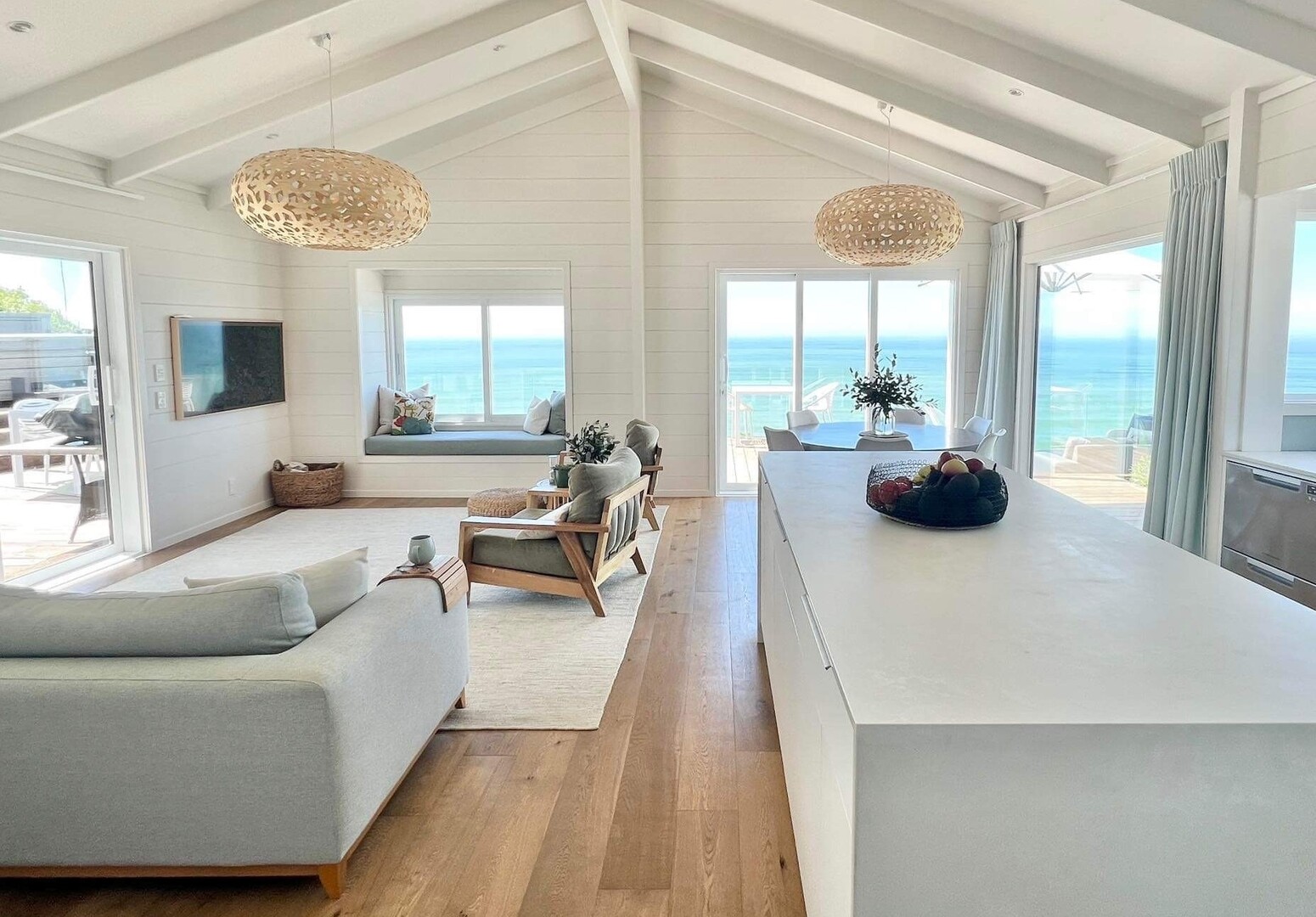
Timber Flooring
A Bold Leap into Wet Areas
The recent modifications to the NZ building code have paved the way for timber flooring to make a splash in traditionally moisture-prone areas such as kitchens and bathrooms. This shift allows for a seamless flow of flooring throughout the home, offering both aesthetic appeal and practicality. Timber's warmth and natural beauty bring a sense of comfort and elegance to these spaces, challenging the conventional reserve of tiles and stone for wet areas.
Distressed and Reclaimed Looks
In wood flooring, distressed and reclaimed appearances are capturing the hearts of homeowners and designers alike. These finishes not only imbue spaces with character and history but also offer a sustainable option by repurposing existing materials. The distressed look, with its worn and aged appearance, adds depth and texture to rooms, while reclaimed wood tells a story, making each floor unique.
Geometric Precision
Precision-cut geometric patterns in wood flooring are another trend gaining traction. This style leans towards a more contemporary aesthetic, allowing for creative and customisable designs that can transform a space. From herringbone to chevron and intricate parquetry, geometric patterns provide a modern twist to the natural appeal of wood, creating floors that are as much art as they are functional.
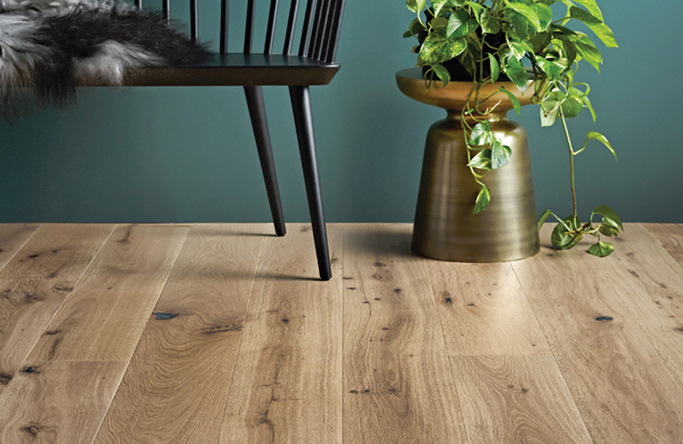
Innovation in Natural Materials
Natural Stone and Tiles
Despite the growing interest in timber for wet areas, natural stone and tiles continue to hold a place of preference for many. Their durability, water resistance, and timeless beauty make them ideal for bathrooms, kitchens, and laundry areas. 2024-25 sees these materials being used in innovative ways, with bespoke patterns and finishes that add a personal touch to spaces. From the organic patterns of marble to the rustic charm of terracotta, natural stone and tiles offer endless possibilities for customisation.
Cork Tiling
Cork tiling emerges as a standout trend, combining sustainability with cutting-edge design. Known for its excellent insulation properties and comfort underfoot, cork is also remarkably durable and water-resistant, making it suitable for a wide range of applications, including wet areas. Its natural texture and warmth add an inviting feel to interiors, while its eco-friendly credentials appeal to environmentally conscious homeowners.
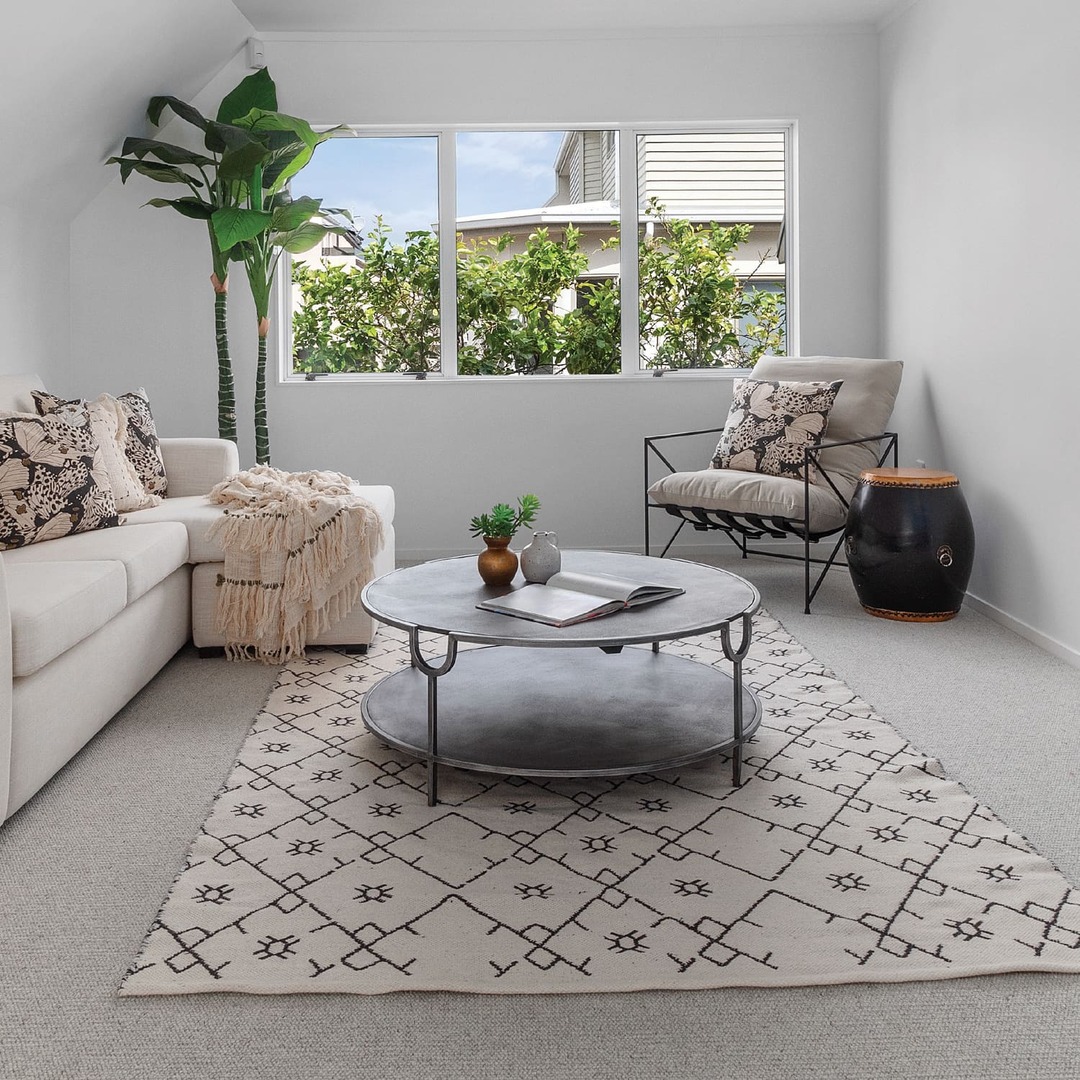
Softening the Hard Edges
Rugs
In the realm of hard flooring, rugs play a pivotal role in softening spaces and adding layers of texture and colour. As hard flooring options become more diverse and widespread, the use of rugs to delineate spaces, introduce comfort, and add aesthetic value has become increasingly significant. Whether it's a plush wool rug in the living room or a waterproof mat in the bathroom, rugs complement hard flooring beautifully, offering both functional and decorative benefits.
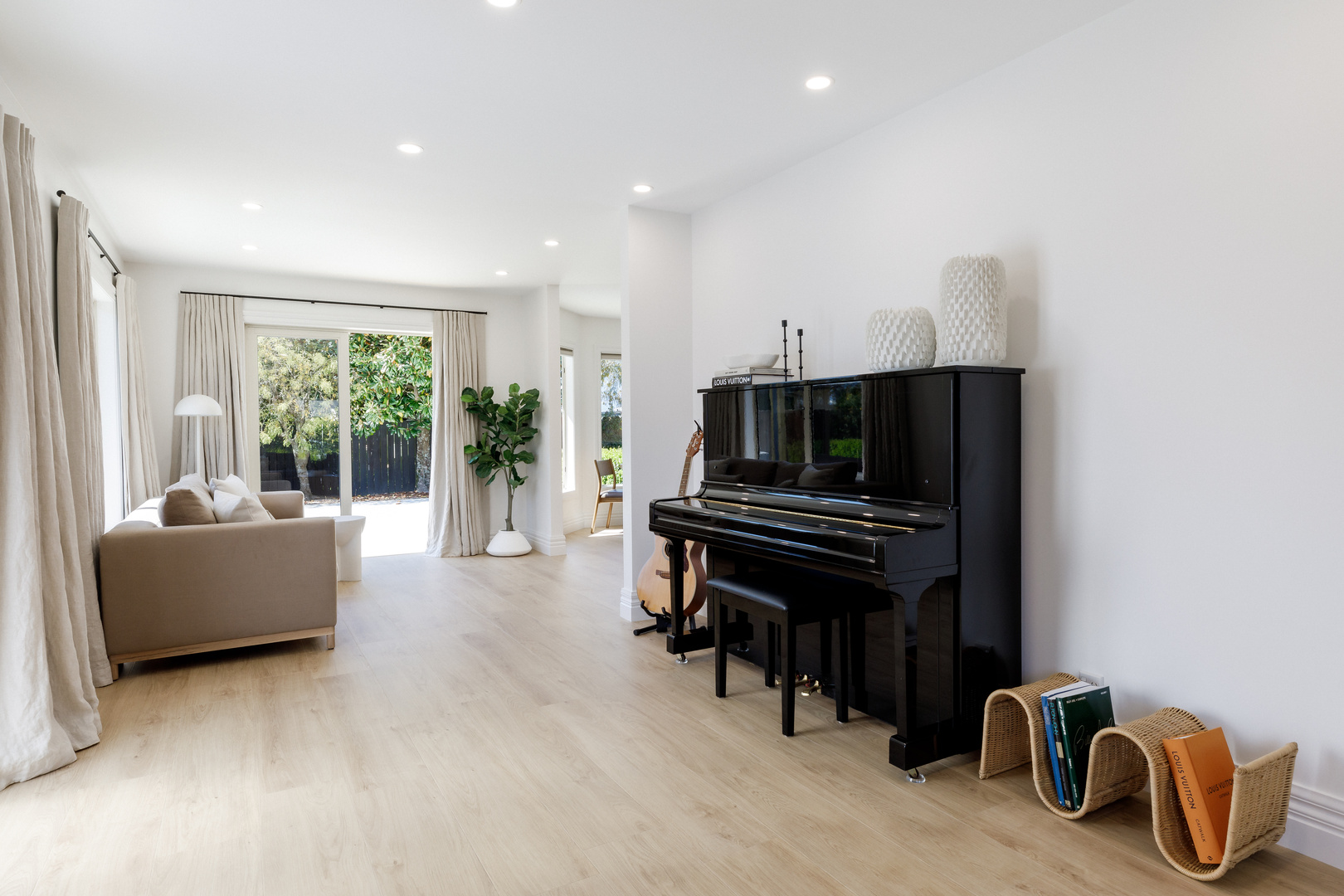
Making the Right Choice for Your Home
Selecting the right hard flooring for your home involves more than just picking an on-trend material you love; it's about considering durability, maintenance, compatibility with your lifestyle, and aesthetic coherence. Here are essential tips to help you navigate the decision-making process and ensure you choose hard flooring that meets both your practical needs and design aspirations.
1. Consider the Room's Function
Different rooms have different requirements. For wet areas like kitchens and bathrooms, look for water-resistant materials such as cork, tiles, or specially treated timber. Living areas and bedrooms may benefit from the warmth and comfort of wood or the innovation of cork tiling.
2. Think About Durability
Consider the amount of foot traffic each area will receive. Hardwoods and stone tiles are durable and can withstand a lot of wear, making them ideal for high-traffic areas. Cork, while durable and comfortable, may be better suited for areas with moderate traffic due to its softer nature.
3. Maintenance Matters
Some flooring options require more upkeep than others. Natural stone and hardwood floors might need sealing or refinishing periodically, while tiles and cork are relatively low-maintenance. Consider how much time and effort you're willing to invest in upkeep before making a decision.
4. Aesthetic Alignment
Your floor should complement your home's overall design theme. Distressed and reclaimed wood options can add character to a rustic or industrial aesthetic, while precise geometric patterns in wood or tile might suit a more contemporary or modern home. Consider the visual flow between rooms to ensure consistency.
5. Environmental Considerations
For those concerned with sustainability, look for flooring materials that are renewable, recycled, or sustainably sourced. Cork and reclaimed wood are excellent eco-friendly options that do not compromise on style or durability.
6. Comfort and Insulation
Flooring can significantly impact the comfort of your home. Wood and cork are naturally warm and can help insulate your home, potentially reducing heating costs. If you prefer stone or tile, consider incorporating underfloor heating or strategically placed rugs for added warmth.
7. Budget
Hard flooring can vary widely in cost, not just for the materials themselves but also for installation. Set a realistic budget that includes both purchase and installation costs. Don't forget to factor in the longevity and maintenance requirements of the flooring, as a more expensive option might be more cost-effective in the long run.
8. Samples in Your Space
Before making a final decision, obtain samples of your preferred flooring options. Observe how they look in your space at different times of the day and under various lighting conditions. This can help you see how the material complements your home's interior and whether it meets your expectations in terms of style and practicality.
9. Consult a Professional
Especially for choices related to wet areas or unique design ideas, consulting with a professional can provide valuable insights. They can offer advice on the best materials for your needs, installation tips, and how to get the best value for your investment.
Choosing the right hard flooring is a significant decision that can affect both the aesthetics and functionality of your home. By considering these tips, you can select flooring that not only looks great but also suits your lifestyle and lasts for years to come.
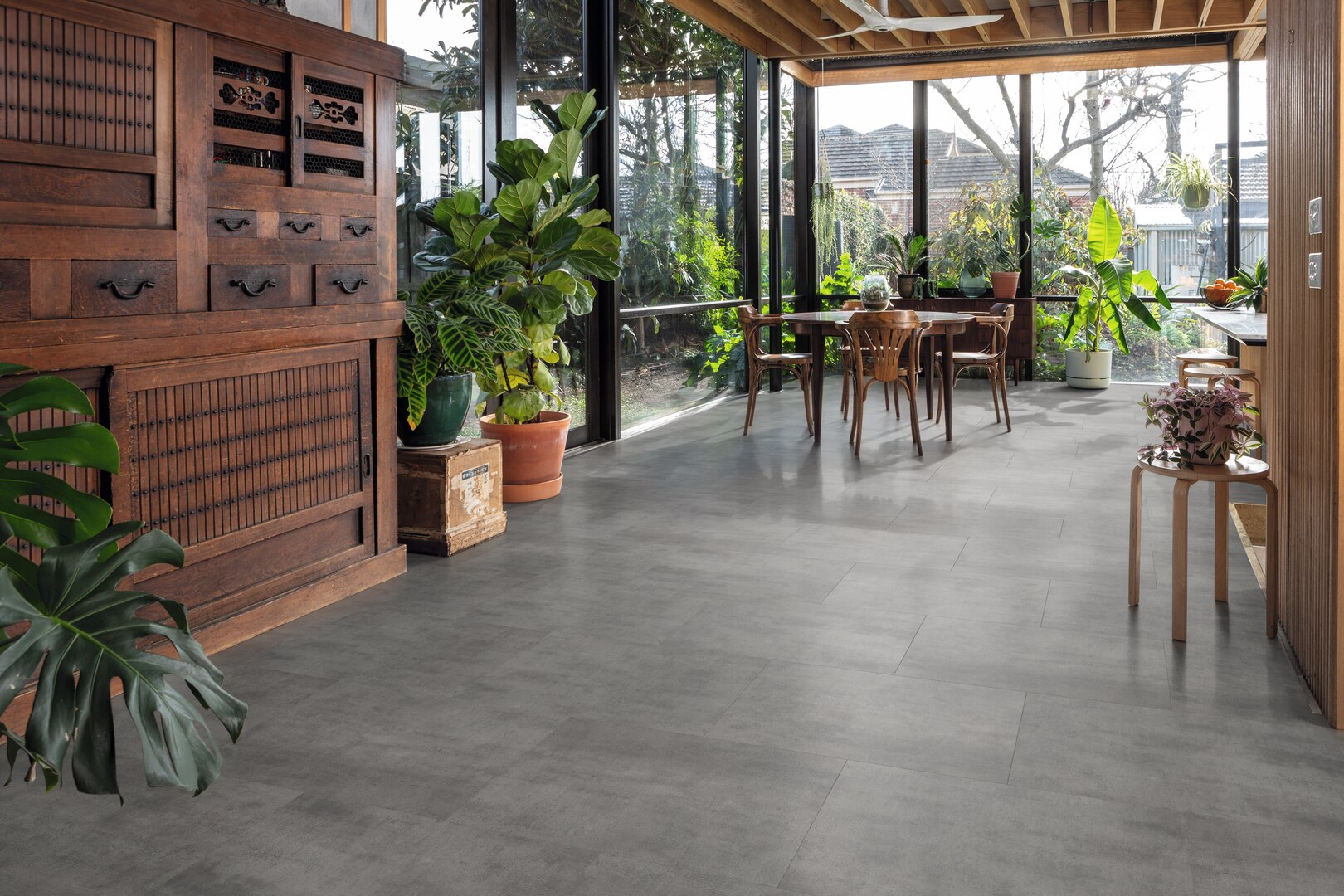
Conclusion
The hard flooring trends for 2024-25 illustrate a move towards materials and designs that reflect a balance of innovation, sustainability, and timeless elegance. With the expanded use of timber in wet areas, the enduring popularity of natural stone and tiles, the rise of cork tiling, and the strategic use of rugs, there's never been a more exciting time to explore flooring options. These trends offer homeowners the opportunity to create spaces that are not only beautiful and functional but also uniquely tailored to their personal style and environmental values.
This article was originally published on the 10th April, 2023.
Style versus longevity – which is the more important?
When it comes to flooring, the answer is both. The trick is finding styles and products that look good now and tie in well with current interior design colours and furniture trends, but won’t be out of date in a couple of years.
Here’s some suggestions for choosing hard flooring that are hot right now, and not likely to cool too quickly!
1. Wood-look flooring
This isn’t new to 2023 but the fact that it has been the number one flooring trend two years in a row tends to suggest it will be around for some time to come. Wood-look flooring in laminate, vinyl and ceramic tile can be the ideal solution for those who want to combine the character and warmth of wood with the more practical attributes of other hard flooring options.
2. Waterproof flooring
For years, tile was really your only waterproof flooring option. But these days, you can purchase waterproof vinyl, laminate and even engineered timber – an answer to prayer for busy homeowners, families – especially those with small children - and pet owners.
3. Textured flooring
Texture in flooring was once reserved for carpet, but these days, you will find handscraped, wirebrushed and fully distressed floors in wood, laminate and tiles as well.
4. Environmentally-responsible flooring
In these more environmentally responsible times, homeowners don’t just want to know that their flooring will wear well and be great value for money. They also want to know where their floor came from. One of the reasons why natural, renewable, recyclable and home-grown materials are very much on trend right now. The Floret range of recycled timer is an excellent example of this.
5. Blonde flooring
Don’t worry; grey is still very popular and not likely to disappear any time soon. But blonder tones are also becoming more prominent now, and no wonder. Light, airy, blonde flooring works with just about any decor and instantly makes your room look bigger.
Thanks to American company Flooring Inc for some of the information in this blog.
